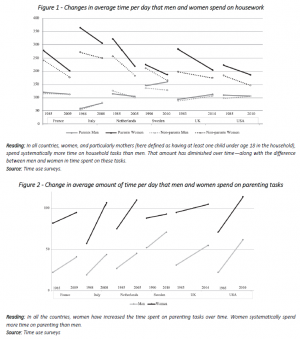United States and Europe: towards a balance of time devoted to domestic work between men and women?
Despite a considerable increase in number of women doing paid work, women still do most house- and parenting work. Ariane Pailhé (INED), Anne Solaz (INED), and Maria Stanfors (Center for Economic Geography, Lund University, Sweden) analyze trends in this unpaid work by sex in Europe and the United States over the last decades. The differential between men and women is closing, primarily due to women reducing the amount of time they spend on housework. Both men and women spend more time with their children.
A convergence due primarily to women spending less time on housework
The amount of time men and women spend on domestic work is tending toward convergence in all the countries studied (France, Italy, the Netherlands, Sweden, the United Kingdom, and the United States). The convergence is primarily due to a sharp decrease in the time women spend on housework, a phenomenon observed in all the countries since the mid-1980s (Figure 1). For men changes are less marked and show stronger contrasts. In the United States, following a considerable increase in men’s participation in housework from 1965 to 1985, levels remained constant from 1985 to 2006. In France, the amount of time men spend on household tasks has declined slightly, as in the Netherlands. Men in Sweden take on more domestic responsibilities than men elsewhere, and their participation increased from 1990 to 2010. Convergence in housework is somewhat stronger among parents than in couples that do not have any children living with them, to the point where, in Sweden, there is now less than a half-hour’s difference in the time parents spend on housework every day.
In most countries, the male-female convergence has less to do with a rise in men’s participation than the time women have been able to save due to changes in practices and norms. Examples include increased home help options, technological advances in housework appliances and cleaning products, and changes in norms and standards for meals and cleanliness. However, women are still the ones doing most of the routine, time-consuming tasks such as meal preparation, cleaning, and clothes washing. Men, meanwhile, do more of the so-called discretionary tasks like household repairs and yard work.
Men’s parenting time is increasing, as is women’s
Time spent parenting has changed differently over time from time spent on housework, with both parents gradually devoting more time and attention to their child(ren). This phenomenon is due to a change in norms: parental investment is now considered a necessity for children’s development. Upper-middle class parents were the precursors of a shift to more “intensive” parenting and greater investment in the child’s human capital. In most of the countries studied, both parents devoted more time to their children, notably in routine and developmental activities. In Sweden and the United Kingdom, men increased the time they spend taking care of children more than women, resulting in a less unequal distribution of parenting work. This is not the case in the United States and France, where the rate of increase was similar for men and women, or in Italy and the Netherlands, where women spend more time with their children than men.
Overall, the country differences observed are linked to public policies that promote both equality of the sexes and a good fit between family and work life. Policies that provide financial support for family-related services such as childcare enable women and men to better balance paid work and family responsibilities, which in turn contributes to women’s financial independence and more balanced task sharing.

|
DATA USED This study draws on analysis of 12 time-use surveys (in six countries on two dates) that inform on the distribution of housekeeping and parenting tasks between men and women. The surveys are nationally representative for each of the countries studies and include information on individual and household demographic and socio-economic situations. Countries and period studied: France, Italy, the Netherlands, Sweden, the United Kingdom, and the United States from the mid-1980s to the early 2010s. |
More information
Ariane Pailhé, Anne Solaz et Maria Stanfors, 2021, The Great Convergence: Gender and Unpaid Work in Europe and the United States, Population and Development Review 47: 181-217.
On line :March 2022

